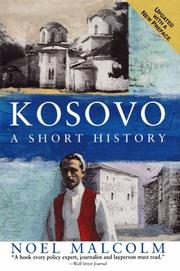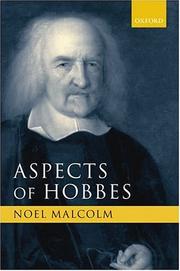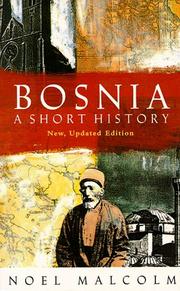| Listing 1 - 10 of 10 |
Sort by
|
Book
ISBN: 9780198830139 0198830130 Year: 2019 Publisher: Oxford Oxford University Press
Abstract | Keywords | Export | Availability | Bookmark
 Loading...
Loading...Choose an application
- Reference Manager
- EndNote
- RefWorks (Direct export to RefWorks)
From the fall of Constantinople in 1453 until the eighteenth century, many Western European writers viewed the Ottoman Empire with almost obsessive interest. Typically they reacted to it with fear and distrust; and such feelings were reinforced by the deep hostility of Western Christendom towards Islam. Yet there was also much curiosity about the social and political system on which the huge power of the sultans was based. In the sixteenth century, especially, when Ottoman territorial expansion was rapid and Ottoman institutions seemed particularly robust, there was even open admiration. In this path-breaking book Noel Malcolm ranges through these vital centuries of East-West interaction, studying all the ways in which thinkers in the West interpreted the Ottoman Empire as a political phenomenon - and Islam as a political religion. Useful Enemies shows how the concept of 'oriental despotism' began as an attempt to turn the tables on a very positive analysis of Ottoman state power, and how, as it developed, it interacted with Western debates about monarchy and government. Noel Malcolm also shows how a negative portrayal of Islam as a religion devised for political purposes was assimilated by radical writers, who extended the criticism to all religions, including Christianity itself. Examining the works of many famous thinkers (including Machiavelli, Bodin, and Montesquieu) and many less well-known ones, Useful Enemies illuminates the long-term development of Western ideas about the Ottomans, and about Islam. Noel Malcolm shows how these ideas became intertwined with internal Western debates about power, religion, society, and war. Discussions of Islam and the Ottoman Empire were thus bound up with mainstream thinking in the West on a wide range of important topics. These Eastern enemies were not just there to be denounced. They were there to be made use of, in arguments which contributed significantly to the development of Western political thought. -- Jacket
Turkey --- Turt︠s︡ii︠a︡ --- Turechchyna --- Tyrkia --- Osmanskai︠a︡ Imperii︠a︡ --- Tourkia --- TC --- Türkiye --- Türkiye Cumhuriyeti --- Vysokai︠a︡ Porta --- Osmanlı İmparatorluğu --- Devlet-i Aliye Osmaniye --- Turkiet --- T.C. (Türkiye Cumhuriyeti) --- Republic of Turkey --- תורכיה --- Turkiyah --- Turkyah --- Tunkī --- République turque --- Tʻŏkʻi --- Anatolia --- Asia Minor --- Anatolie --- Republic of Türkiye --- Asia Minore --- Ottoman Empire --- Republik Türkei --- Tureuki --- Turkye --- Republiek van Turkye --- Türkei --- Turcland --- تركيا --- Turkiyā --- جمهورية التركية --- Jumhūrīyah al-Turkīyah --- Turquía --- Republica de Turquía --- Turchia --- Tuykia --- Türkiyä Respublikası --- Turki --- Républik Turki --- Tȯrkiă --- Турцыя --- Turtsyi︠a︡ --- Турэцкая Рэспубліка --- Turėtskai︠a︡ Rėspublika --- Tiakei --- Torkėjė --- Turkia --- Republik Turkia --- Турция --- Република Турция --- Republika Turt︠s︡ii︠a︡ --- Turska --- Republika Turska --- Tū-ī-gì --- Turecko --- Turecká republika --- Tëreckô --- Repùblika Tërecczi --- Tẏrt︠s︡i --- Турци --- Turt︠s︡i --- Турци Республики --- Turt︠s︡i Respubliki --- Twrci --- Gweriniaeth Twrci --- Tyrkiet --- Republikken Tyrkiet --- Tʼóok Bikéyah --- Turkojska --- Republika Turkojska --- Türgi --- Türgi Vabariik --- Τουρκία --- Δημοκρατία της Τουρκίας --- Dēmokratia tēs Tourkias --- Τουρκική Δημοκρατία --- Tourkikē Dēmokratia --- Turchî --- Repóbblica d'l Turchî --- Turkio --- Turkujo --- Turkia Respubliko --- Turkaland --- Lýðveldið Turkaland --- Turquie (Repupblic) --- République de Turquie --- Turkije --- Tuirc --- Poblacht na Tuirce --- Turkee --- Pobblaght ny Turkee --- Thú-ngí-khì --- 터키 --- 터키 공화국 --- T'ŏk'i Konghwaguk --- Tureke --- Turkowska --- Turcia --- Турк --- Turk --- Турчы Республикæ --- Turchy Respublikæ --- Tyrkland --- Lýðveldið Tyrkland --- Repubblica di Turchia --- טורקיה --- רפובליקה הטורקית --- Republiḳah ha-Ṭurḳiyah --- Тюрк --- Ti︠u︡rk --- Тюрк Республика --- Ti︠u︡rk Respublika --- Tu̇rkii︠a︡ --- Tu̇rkii︠a︡ Respublikasy --- Turukiya --- Uturuki --- Jamhuri ya Uturuki --- Tiki --- Tirkiye --- Komara Tirkiyeyê --- Repuvlika de Turkiya --- Turcija --- Turcijas Republika --- Tierkei --- Republik Tierkei --- Turkija --- Turkieë --- Törkieë --- Buturuki --- Ripablik kya Buturuki --- Törökország --- Török Köztársaság --- Турција --- Република Турција --- Republika Turcija --- Whenua Korukoru --- Tū-ī-gì Gê̤ṳng-huò-guók --- Туркамастор --- Turkamastor --- Туркань республиксь --- Turkanʹ respubliksʹ --- Bu̇gd Naĭramdakh Turk Uls --- Tlacatlahtocayotl Turquia --- Republiek Turkije --- トルコ --- Toruko --- トルコ共和国 --- Toruko Kyōwakoku --- Turkii --- Republikken Tyrkia --- Turtchie --- Турций --- Turt︠s︡iĭ --- Тюркия --- Ti︠u︡rkii︠a︡ --- Тюркия Республика --- Ti︠u︡rkii︠a︡ Respublika --- Teki --- Törkie --- Turcja --- Republika Turcji --- República da Turquia --- Republica Turcia --- Republika Turkiya --- Turkya --- Turkiya Republika --- Турція --- Турецка Республіка --- Turet︠s︡ka Respublika --- Турецкая Республика --- Tu̇rkiĭė --- Tu̇rkiĭė Respublikata --- Durka --- Durkka dásseváldi --- Turkäi --- Republik Turkäi --- Turqia --- Republika e Turqisë --- Thekhi --- Turcyjo --- Republika Turecko --- Republika Turcyje --- Jamhuuriyada Turki --- Turkiyakondre --- Ripoliku Turkiyakondre --- Турска --- Република Турска --- Turkki --- Turkin tasavalta --- Republiken Turkiet --- Republika ng Turkiya --- Tturk --- Tagduda n Tturk --- Turchie --- Repubbleche de Turchie --- Tȯrkii︠a︡ --- Tȯrkii︠a︡ Jȯmḣu̇rii︠a︡te --- Türkiýe Respublikasy --- Туреччина --- Турецька Республіка --- Republica de Turchia --- Thổ Nhĩ Kỳ --- Cộng hoà Thổ Nhĩ Kỳ --- Türkän --- Türgü --- Türgü Vabariik --- 土耳其 --- Tu'erqi --- Turkeye --- Republiek Turkeye --- Turkeya --- Tirki --- Republik bu Tirki --- טערקיי --- Ṭerḳay --- טערקישע רעפובליק --- Ṭerḳishe Republiḳ --- Orílẹ̀-èdè Olómìnira ilẹ̀ Túrkì --- Tırkiya --- 土耳其共和國 --- Tu'erqi Gongheguo --- Tu'erqi gong he guo --- Tu er qi gong he guo --- Ānātūlī --- History --- Foreign public opinion, European. --- Islam --- History of Europe --- anno 1500-1799 --- anno 1400-1499 --- Empire ottoman --- Histoire. --- Public opinion, European. --- Islambild --- Rezeption --- 1288-1918 --- Turkey. --- Europa --- Osmanisches Reich --- Westliche Welt --- Political science --- History. --- Cộng hoà Thỏ̂ Nhĩ Kỳ --- Thỏ̂ Nhĩ Kỳ --- Турций --- Islambild. --- Rezeption. --- 1288-1918. --- Europa. --- Osmanisches Reich. --- Westliche Welt. --- Ottoman Empire, 1288-1918

ISBN: 0060977752 9780060977757 Year: 1999 Publisher: New York: Harper Perennial,
Abstract | Keywords | Export | Availability | Bookmark
 Loading...
Loading...Choose an application
- Reference Manager
- EndNote
- RefWorks (Direct export to RefWorks)
Kosovo (Serbia) - History. --- Kosovo (Serbia) - Ethnic relations --- History of Southern Europe --- Kosovo --- Kosovo (Serbia)
Book
ISBN: 0006388442 Year: 1997 Publisher: London Fontana
Abstract | Keywords | Export | Availability | Bookmark
 Loading...
Loading...Choose an application
- Reference Manager
- EndNote
- RefWorks (Direct export to RefWorks)
Poetry --- English literature --- anno 1600-1699

ISBN: 9780199275403 Year: 2007 Publisher: Oxford Clarendon
Abstract | Keywords | Export | Availability | Bookmark
 Loading...
Loading...Choose an application
- Reference Manager
- EndNote
- RefWorks (Direct export to RefWorks)
Book
ISBN: 9780241003893 Year: 2015 Publisher: London Allen Lane, an Imprint of Penguin Books
Abstract | Keywords | Export | Availability | Bookmark
 Loading...
Loading...Choose an application
- Reference Manager
- EndNote
- RefWorks (Direct export to RefWorks)
History of Europe --- anno 1500-1599 --- Mediterranean countries

ISBN: 0814755615 0814755208 Year: 1996 Publisher: New York, N.Y. New York University Press
Abstract | Keywords | Export | Availability | Bookmark
 Loading...
Loading...Choose an application
- Reference Manager
- EndNote
- RefWorks (Direct export to RefWorks)
Book
ISBN: 9780198886334
Abstract | Keywords | Export | Availability | Bookmark
 Loading...
Loading...Choose an application
- Reference Manager
- EndNote
- RefWorks (Direct export to RefWorks)
"This book describes and analyses the nature of male-male sexual relations in Europe, the Ottoman Empire and the European colonies in the Americas and Asia during the period 1400-1750. It discusses the sexual behaviour itself, its social and institutional contexts, the treatment of it in religious doctrine and law (both Christian and Muslim) and the representation of it in literature (both Western and Ottoman). While synthesising, and adding to, a mass of evidence accumulated by historians since the 1980s, it also challenges the fundamental assumptions that have dominated the modern historiography. Previous writers have taken evidence from Southern European countries such as Italy and Spain, where a distinctive pattern of age-differentiated sex predominated, and treated it as universal in Europe before 1700. They have then struggled to explain the existence, well documented soon after that date, of a very different pattern in Northern Europe, concluding that the early 18th century saw the sudden and inexplicable emergence of something resembling modern homosexuality. This book presents an original solution to the problem, both by distinguishing between typical and untypical sexual behaviour in Southern Europe, and by demonstrating that the standard pattern in the South was not replicated in the North. This makes it possible, for the first time, to give a coherent account of the long-term development in Europe of what we now call homosexuality"--
Book
ISBN: 9780199602629 9780199602636 9780199602643 9780199602650 Year: 2012 Publisher: Oxford Clarendon
Abstract | Keywords | Export | Availability | Bookmark
 Loading...
Loading...Choose an application
- Reference Manager
- EndNote
- RefWorks (Direct export to RefWorks)
Political philosophy. Social philosophy --- Political science --- Science politique --- Philosophy --- Early works to 1800. --- Philosophie --- Ouvrages avant 1800 --- Hobbes, Thomas,
Book
Year: 2002 Publisher: Oxford Clarendon
Abstract | Keywords | Export | Availability | Bookmark
 Loading...
Loading...Choose an application
- Reference Manager
- EndNote
- RefWorks (Direct export to RefWorks)
Multi

ISBN: 9780271060170 Year: 2021 Publisher: University Park, Pa Penn State University Press
Abstract | Keywords | Export | Availability | Bookmark
 Loading...
Loading...Choose an application
- Reference Manager
- EndNote
- RefWorks (Direct export to RefWorks)
| Listing 1 - 10 of 10 |
Sort by
|

 Search
Search Feedback
Feedback About UniCat
About UniCat  Help
Help News
News